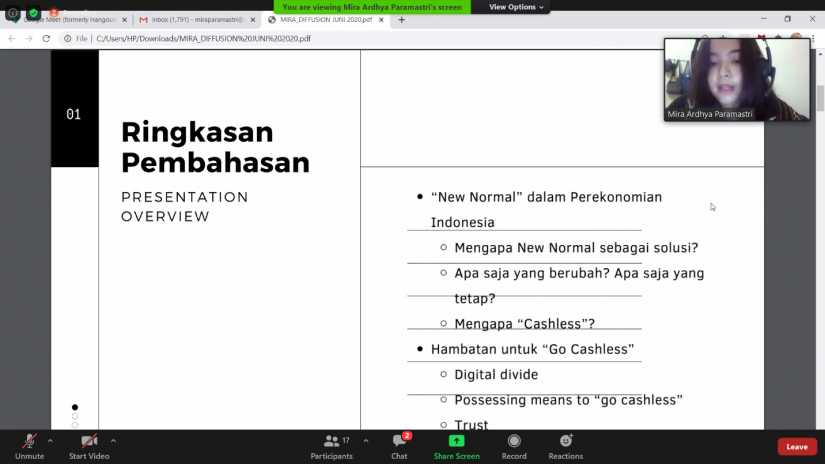
Yogyakarta, June 19th 2020—Center for Digital Society (CfDS) Fisipol UGM also discussed about new normal in the Digital Future Discussion #27 on the last Friday (19/6). This discussion which titled as ‘New Normal’ were held on the Zoom Meeting from 03.00 p.m. to 04.30 p.m. In this occasion, CfDS presented two speakers, they were Mira Ardhya Pramastri and Samuel Giovanno Johannes, both of them were the research assistant of CfDS. The discussion was moderated by Aldo Rafi.
The first topic was brought by Mira Ardhya titled as ‘Going Cashless in the New Normal: Challenges for Indonesia’s SMEs’. Mira highlight the decreasing of Indonesia’s GDP and the other complaints about people that had impacted economically. On the other side, COVID-19 cases itself is increasing everyday. New Normal itself gave the possibilities to some economic activities to be opened normally in this pandemic condition, by keep doing the health protocol. The economic activities that were limited in the large-scale social restrictions (Pembatasan Sosial Berskala Besar/PSBB) were opened again in this new normal era. Mira said that digital practice and cashless payment could be the solution. This way could be permanent if the consumers were comfortable.
Cashless practice that usually used in the e-commerce are considered as safer and more hygienic than the cash transaction. Besides that, there are several obstacles in the application of cashless practice. One of them is digital gap, such as the location that limited the access, low digital literacy, and the limitations of electronics ownership. One of the other obstacles is the added cost when we top up our balance in certain platforms, it is burdensome to some users. Trust also becomes one of the problems, because there are still many people that being sceptical about the security of online shopping.
The Micro, Small, and Medium Enterprise (Usaha Mikro, Kecil, dan Menengah/UMKM) itself gave several options, such as cash on delivery, or still using online payment at the risk of losing their potential customers. Mira expected the involvement of the government in this case. “Policy maker could strategize to make the transition from cash to cashless becomes easier, if it was considered as an alternative,” Mira said as the closing of her session.
The next session was brought by Samuel Giovanno Johannes with a theme ‘The Possibility of E-Learning Methods in Replacing Face to Face Learning Methods in New Phase of the Pandemic’. The online learning process was considered as not optimal. One of the obstacles is the access of internet that is not evenly distributed. From the technical side, households internet access is still lagging behind Malaysia and Singapore, our neighbor countries.
To maximize the online learning, according to Samuel, the Indonesian government was expected to strategize things through various dimensions. Some of them are technology, pedagogy, management, interface design, supportive resources, and evaluation. The instructions of online learning should be adjusted to the learning environment. As the closing of his session, Samuel said, “E-Learning is not just about visualized of conventional learning. Infrastructure and curriculum design should be maximized in the practice,”.
In the end of the discussion, the audience could ask the speakers in a question and answer session. The recording of Difussion #27 could be watched on the CfDS UGM YouTube channel. In the future, CfDS will routinely hold an online discussion with various programs that it has.
